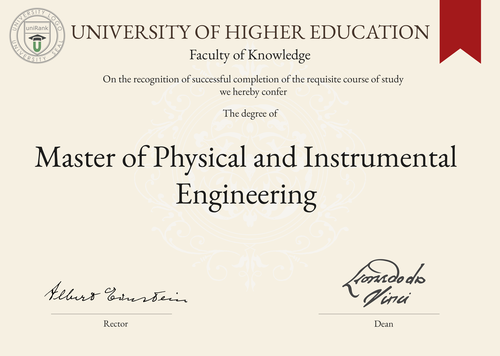
Master of Physical and Instrumental Engineering (M.P.I.E.)
Guide to Master of Physical and Instrumental Engineering Program/Course/Degree
Master of Physical and Instrumental Engineering (M.P.I.E.)

Program Name:
Master of Physical and Instrumental EngineeringProgram or Degree abbreviation:
M.P.I.E.Duration range:
Varies by country and universityTuition range:
Varies by country and universityOverview:
The Master of Physical and Instrumental Engineering program is designed to provide students with advanced knowledge and skills in the field of physical and instrumental engineering. This program focuses on the development and application of cutting-edge technologies in various industries, including manufacturing, telecommunications, healthcare and research.Curriculum Overview by year:
The curriculum of the Master of Physical and Instrumental Engineering program is typically divided into several core areas of study. In the first year, students usually take foundational courses in subjects such as advanced mathematics, physics, electronics and computer programming. In the second year, students delve deeper into specialized topics such as control systems, signal processing, optics and instrumentation.Key Components:
The key components of the Master of Physical and Instrumental Engineering program include theoretical knowledge, practical skills and research experience. Students gain a strong foundation in the principles of physical and instrumental engineering, learn to design and analyze complex systems and acquire hands-on experience with state-of-the-art equipment and software.Career Prospects:
Graduates of the Master of Physical and Instrumental Engineering program have excellent career prospects. They can pursue various roles in industries such as telecommunications, manufacturing, aerospace, healthcare and research. Potential career paths include instrumentation engineer, research scientist, systems engineer, project manager and technical consultant.Salary Expectations:
The salary expectations for graduates of the Master of Physical and Instrumental Engineering program can vary depending on factors such as the country, industry and level of experience. Generally, professionals in this field enjoy competitive salaries, with the potential for growth and advancement. For a more accurate understanding of salary expectations, you can utilize the Job Sites Search Engine, from our sister site jobRank, which searches over 4,600 job sites worldwide. Make sure to specify not only the job title but also the country you are interested in.Conclusions:
It is important to note that the duration, tuition fees, curriculum, key components, career prospects and salary expectations of the Master of Physical and Instrumental Engineering program can vary based on the chosen country or location of study, as well as the chosen university. Prospective students are encouraged to research and compare different programs to find the best fit for their academic and career goals. Visitors interested in pursuing this specific degree, the Master of Physical and Instrumental Engineering, can utilize the uniRank World Universities Search Engine to explore universities offering this program worldwide. This search engine provides a comprehensive database of universities, allowing individuals to find institutions that offer the program in their desired location.World Universities Search Engine
search for Master of Physical and Instrumental Engineering (M.P.I.E.) and add the Location (country, state etc.) or specific University you are interested in studying at.
Query examples:
- Master of Physical and Instrumental Engineering (M.P.I.E.) United States
- Master of Physical and Instrumental Engineering (M.P.I.E.) United Kingdom online
- Master of Physical and Instrumental Engineering (M.P.I.E.) Australia international students
- Master of Physical and Instrumental Engineering (M.P.I.E.) University of California
- Master of Physical and Instrumental Engineering (M.P.I.E.) University of London tuition fees
- Master of Physical and Instrumental Engineering (M.P.I.E.) University of Sydney scholarships
Share Program/Course
Interesting? Share this program/course/degree info with your friends now.